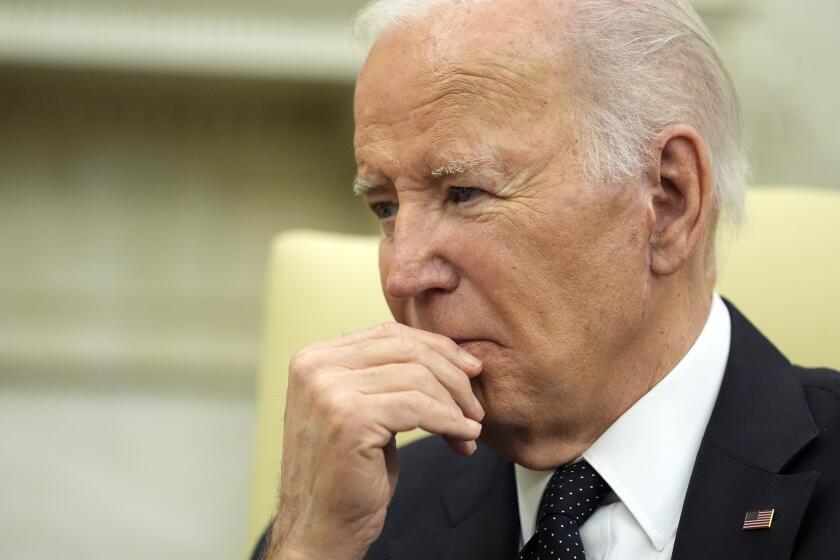Climate of Mistrust Clouds Peace in Nicaragua
When the Contras returned to Managua for the first time, it was the job of Emigdio Suarez to make them uncomfortable.
Suarez is the acerbic radio reporter for the Voice of Nicaragua, a 6-megawatt mouthpiece of the Sandinista revolution. And while leaders of the government and U.S.-backed Nicaraguan rebels met in a hotel last weekend for private peace talks, it was Suarez who waged war over the public airwaves with his aggressive interrogation of any Contra who ventured before the journalists outside.
“What have you come for?” he demanded on the air, after a Contra spokeswoman complained about the rebel delegation’s confinement--”like hostages”--to the hotel. “Have you come to play politics or negotiate a cease-fire?”
“We came to speak to the people,” replied the spokeswoman, Marta Sacasa. “Reconciliation requires an interchange of opinions among all Nicaraguans.”
Underscores Obstacles
“You can speak to the Nicaraguans if you lay down your arms and accept amnesty,” Suarez retorted.
“The Nicaraguan Resistance will never accept amnesty, because amnesty is a pardon for a crime,” Sacasa declared. “We have committed no crimes.”
Although the rebel leaders’ 72-hour homecoming marked a quantum leap in the peace process, the harsh exchange underscored some of the obstacles to a final settlement of the six-year Nicaraguan conflict.
Even as a month-old truce prevails on the battlefield, mutual mistrust is straining the political recognition that the warring factions have granted each other. The preliminary peace accord signed at Sapoa, Nicaragua, on March 23 has not buried the unforgiving Sandinista rhetoric or unrepentant Contra attitude toward the war that has cost an esimated 26,000 lives and untold economic damage.
At no time in Central America’s history of turmoil have a government and a guerrilla movement taken so many steps toward a negotiated peace, one that seeks the rebels’ return to civilian life with full political rights instead of an outright surrender by either side. But the Managua talks that recessed Monday for 10 days stumbled over what both sides called mutual suspicions.
The Sandinistas suspect that Enrique Bermudez, the Contra commander in chief who did not sign the Sapoa accord or come to Managua, is plotting--with encouragement from hawks in the Reagan Administration--to resume the fighting when the current truce expires May 31.
Rebel negotiators, all civilian politicians, have refused to commit Bermudez’s troops to a deadline for laying down their weapons. First they want to see the Nicaraguan government take steps to broaden freedom for opposition groups; they suspect that the Sandinistas will not take them once the insurgents are disarmed.
In return for their recognition of the Sandinista government and constitution, the Contras are seeking an opposition television station, more non-Sandinista judges in the courts and an independent council to supervise future elections. They want to end the military draft, reduce the size of the army and rid its training program of Sandinista party ideology.
Opening Up System
Since it signed a Central American peace accord last August, the government has taken several steps to turn what critics call a one-party dictatorship into a more open system. But the rebels’ presence in the capital had a limited political impact because the government confined them to their hotel, except for two brief outings, and allowed only relatives to visit.
In doing so, the Sandinistas took a lesson from their own 1979 guerrilla triumph over President Anastasio Somoza’s dictatorship.
Under military pressure, Somoza allowed 12 exiled pro-Sandinista civilian leaders known as “Los Doce” to come to Managua and take part in politics. Tens of thousands of people lined the streets when the 12 drove in from the airport in July, 1978, and the ensuing political agitation contributed to Somoza’s military defeat a year later.
As the Contras left town Monday night, President Daniel Ortega gathered 20,000 government workers and supporters for a rally. “We were not afraid of having the Contras here,” he boasted, “because we knew the people would turn their backs on them.”
La Prensa, the opposition newspaper allowed to reopen six months ago, cried foul. “With the attitude of a jailer, the government has shown its fear of the people’s reaction,” it said in an editorial. “This is fear of democracy.”
Sandinista officials say rebels cannot have full political rights until they pledge to end the war. “Until now, they have been political instruments of U.S. aggression,” Deputy Foreign Minister Victor Hugo Tinoco said. “It’s illogical that they can move around Managua like a group of tourists.”
During the two outings allowed the rebels Monday, small but fervent crowds of 100 to 200 people shouted “Long live the Resistance!”
Those who greeted them outside La Prensa’s offices in Managua’s industrial zone included relatives of anti-Sandinista prisoners and workers from the nearby Coca-Cola bottling company. The plant, now under state control, was managed by Adolfo Calero until he went into exile in 1982 and became a Contra leader.
“We hope Mr. Calero will return to run Coca-Cola again, or to run the country,” declared Mario Jose Paz, 34, who works at the plant.
Because the Contras have been both illicit and absent, such expressions of outright support were inconceivable in the capital until last week.
Tight Police Control
Perhaps a majority of Nicaraguans now oppose the Sandinistas, who are burdened by economic decay. But tight police control of the cities has kept the rebels from turning the discontent into active support for their insurgency.
The pro-Sandinista newspaper Nuevo Diario said the rebel leaders lack support because they do not understand the social transformations that have benefited Nicaragua’s poor majority during their years in exile.
“They came back with a ridiculously triumphant attitude,” an editorial in the paper said. “If they think democracy means reverting to a society in which they were the dominant class, this they can never achieve.”
Many Nicaraguans, meanwhile, seem worn down by the war, distrustful of both sides and skeptical of any agreement.
Leaders of the internal opposition, who share many of the Contras’ political demands, view the continuing peace talks as a historic but risk-filled opportunity to end a decade of bloodshed.
“If this process succeeds, it will broaden the political space for dissent in Nicaragua,” Augustin Jarquin, a leader of the Social Christian Party, said. “If it fails, that space will close. The war will come back, and we will all be treated (by the government) as Contras.”
More to Read
Start your day right
Sign up for Essential California for news, features and recommendations from the L.A. Times and beyond in your inbox six days a week.
You may occasionally receive promotional content from the Los Angeles Times.






